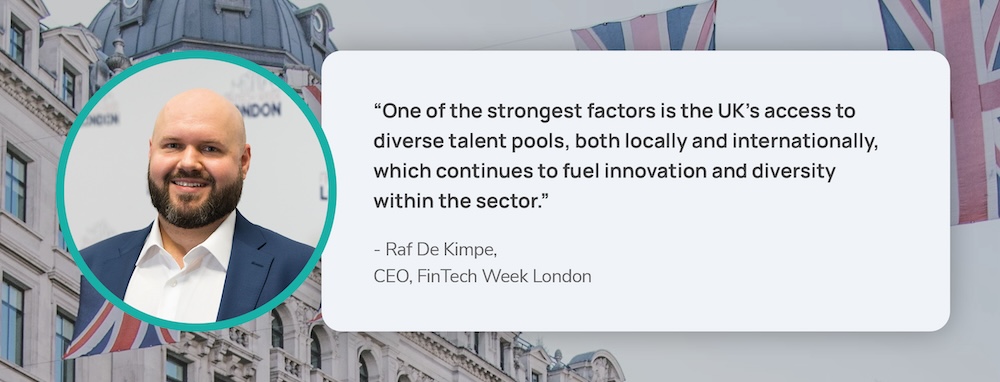Home to some of the world’s fastest-growing fintechs, the UK continues to be ranked as one of the friendliest countries for setting up shop. Despite global fintech investment declining in 2023, the UK remains a haven for fintechs. With industry heavyweights such as Monzo, Starling Bank, SumUp, and Zilch calling the UK home, the nation offers a unique melting pot of disruptive fintechs and established financial institutions.
What’s more, with industry bodies such as Innovate Finance championing the brilliance of UK fintechs, it’s no wonder the country dominates as a global capital for financial products and services, innovation, and growth.
As part of our week-long celebration of UK FinTech Week, we took to the (virtual) streets to find out what makes the UK one of the best locations for fintechs and where the landscape is heading.
What factors contribute to the UK’s reputation as one of the best locations for fintech companies compared to other global hubs?
The UK fintech landscape stands out for its combination of innovative startups, a supportive regulatory environment (like the FCA’s sandbox), access to capital, and close proximity to traditional financial institutions such as those found in the nation’s capital. Together, this ecosystem fosters collaboration and growth, making it a hub for fintech innovation on a global scale.
With over 25 years’ experience in the technology, media, and telecoms sector, our very own CEO, Andrew Doyle has a wealth of insight into what makes the UK a leading destination for fintech investment: “The UK’s fintech scene is a magnet for investment, drawing in billions of pounds, and nurturing unicorns such as Revolut, FNZ, Checkout.com, Wise, Rapyd, SumUp and of course BlockChain.com, eToro and OakNorth. The UK is now recognised across the world as a leading destination for fintech investment.”
But great businesses need great people. As the lifeblood of every organisation, having great talent at the helm sets the foundation for great success. Their expertise drives processes, products and productivity. Fintechs are no different.
CEO of FinTech Week London, Raf De Kimpe explains what makes the UK such a strong hub for great talent and why it sets the nation apart from other global hubs: “One of the strongest factors is the UK’s access to diverse talent pools, both locally and internationally, which continues to fuel innovation and diversity within the sector. As the industry has continued to evolve and develop, it has welcomed new and innovative businesses to also take up location here and provide support and encouragement for growth.”

“Crucially, the UK fosters a culture of innovation and entrepreneurship, which is evident from success stories like Revolut, Monzo, Starling, and Wise (formerly Transferwise), highlighting the impact of the UK’s supportive environment. Additionally, examples like Funding Circle, founded at Oxford University, underscore the importance of talent and education in driving fintech innovation. Together, these elements paint a compelling picture of the UK’s position as a global fintech leader.”
A sentiment echoed by our CEO: “At its core, the UK’s fintech success is driven by a diverse and skilled talent pool, enriched by global perspectives. It is rightly recognised as home to a vast pool of global talent.”
The UK’s fintech scene not only stands out for its innovation, but also for its strong sense of community and collaboration. Unlike traditional sectors where competition and fierce rivalries often reach tipping point, UK fintech firms and stakeholders proudly embrace a culture of collaboration, recognising that working together is the key to driving success and advancing the industry as one.
Leonid Kil, Chief Business Development Officer at Diagram Capital is a huge advocate of this collaborative ethos: “The community aspect is vital. The UK is very finance industry-oriented, with a robust education system in this area, leading to a concentration of intellectual power in metropolitan areas, especially London.
“Furthermore, professional associations, groups, and members’ clubs are widely popular in the UK, fostering a continuous exchange of information and attracting professionals from other parts of Europe and the world to share knowledge.”
How does the UK regulatory environment support innovation and growth?
The UK’s regulatory environment strikes a delicate balance between fostering innovation and maintaining regulatory standards, creating fertile ground for the growth and development of some of the world’s leading fintechs.
“The UK’s regulatory environment is designed to support innovation while safeguarding consumers. With a well-established framework, it balances encouraging new ideas and ensuring protection,” Raf explains.
For some, the robust regulatory frameworks are what sets the UK apart on the global fintech stage, as Leonid explains: “The UK’s superior, established financial market infrastructure includes systems for both local and international financial operations. The regulatory environment is highly developed, with the Financial Conduct Authority being the most qualified authority in this field. The same applies to high-street banks, which are open for collaboration with fintech companies and are familiar with compliance measures and clients that are using fintech services.”
Raf explains more about how the FCA’s sandbox provides a safe space for fintechs to test new products and services in the market: “Take, for instance, the Regulatory Sandbox by the FCA, an innovative platform that allows businesses to test their ideas with real consumers, ensuring they meet necessary standards before full-scale implementation.
“It’s open to various firms, guiding consumer protection measures throughout the process. This approach promotes experimentation while maintaining regulatory compliance and ultimately supporting the growth of innovative solutions in the UK’s fintech landscape. Unsurprisingly, the sandbox approach has been reapplied globally, with the FCA influencing standards internationally.”
What are some key success factors that have enabled the UK to build and maintain its position as a global leader in fintech?
The UK’s leadership in fintech is underpinned by a combination of factors, from its regulatory environment and attractiveness to investors to its international connectivity and diverse talent pool.
Even in periods of downturn, the UK’s fintech scene continues to buck global trends with continued investment in the sector, as Raf explains: “In 2023, despite a downturn globally, the UK saw more investment into its fintech sector than the rest of Europe combined and was second only to the US – a testament to the culture of innovation and expertise that exists here. London attracted just under 90% of that funding, cementing its position as a global Fintech hub.
“Similarly, initiatives like DeepMind Technologies showcase the UK’s commitment to investing in research and development to fuel continuous innovation. Additionally, the UK’s support for startups and SMEs, epitomised by hubs like Grow London, lays a strong foundation for fintech growth. This support network empowers small businesses to thrive, thus nurturing the ecosystem.
“What’s more, the UK actively promotes fintech through events and partnerships (such as Fintech Week London), amplifying its presence as a global hub. Such collaborative efforts strengthen the growing need for fintech innovation, solidifying the UK’s position as a global leader. The UK continues to be ranked as one of the most fintech-friendly countries globally, and the Khalifa Review confirmed that fintech is no longer a niche, stating its permanent place within financial services.”
But it hasn’t always been smooth sailing for fintechs in the UK. Its rise as a global leader in fintech has gradually evolved over time. Regulatory frameworks have evolved, technology has advanced, and public perception of fintechs changed; the entire process of building an environment conducive for startups happened over a number of years.
Nadia Edwards-Dashti, Chief Customer Officer of Harrington Starr, a leading fintech recruitment agency, shares how the UK’s rise to being a fintech hotspot hasn’t always been easy-going: “The story here isn’t straightforward. The UK has definitely shown itself to be a leading global fintech hub over the past few years, however, more recently, questions have been raised around whether the crown the UK once had is slipping.
“But, there are hugely prosperous foundations and plentiful success stories to share. The UK has an opportunity to cement its past strength as a leader in this space.
“In the past ten years, the UK has created 134 tech unicorns (companies with a valuation of over $1 billion), more than France and Germany combined. Despite the economic downturn, the UK still remained on top in 2023. European fintech companies raised a combined investment of $1.24bn in Q3 2023, a 72% reduction from Q3 2022. The UK was the most active European fintech country in Q3 2023 with 85 deals, a 38% share of deals.
“What’s more, corporate tax in the UK has been favourable, at one point being the lowest compared to other countries. The UK has a reputation for supporting the fintech growth mindset and health, with pledges to increase investments in R&D was pledged fourfold to £20 billion by 2025,”
How do you predict the UK fintech landscape will evolve in the future?
As the global fintech landscape continues to evolve at rapid pace, all eyes are on the UK as a key player in shaping the future of financial technology. With its robust regulatory framework, access to talent, and thriving financial services ecosystem, how will the UK continue to cement its place as a global leader in fintech innovation?
Nadia shares her take: “As of Q2 2024, the global fintech scene has endured at least five quarters of a challenging market. Despite these geopolitical and economic challenges, there are ‘glimmers of a tide change’ on the path to a more prosperous future. With these solid foundations in the UK’s infrastructure, ecosystem, investment and policymakers, it will continue to be a great place for fintech.”

“Being an election year, change is afoot, and queries have been raised over the ease of visas, the longevity of tax benefits, the effectiveness of the regulators, and access to VCs. The UK still has a huge opportunity in its readily available talent for the fintech community, and with recent tech cuts across all industries, there’s a plentiful pool of experience waiting to be hired. Fintechs can capitalise on that.”
As the world of finance undergoes a seismic shift driven by technological innovation and AI, the UK fintech sector is poised for a promising future, offering both unprecedented opportunities and challenges in equal measure.
Raf continues: “As we look into the future of UK fintech, we’re clearly entering a growth and innovation phase. Despite facing recent challenges, the sector remains resilient and composed for evolution. With over 2,500 fintech companies in the UK, the landscape is vibrant, attracting significant investment despite a global decline in 2023.
“We’re witnessing a shift towards sustainable growth models, focusing on real-world benefits rather than short-term gains. Investors and consumers are increasingly perceptive, favouring purpose-driven innovation. This shift is expected to continue, with a spotlight on ESG strategies and responsible operations, as well as improving diversity and inclusion. Innovation remains key, with emerging technologies like AI and machine learning driving opportunities for better financial services.
“As we navigate regulatory challenges, partnerships and compliance will be crucial for long-term success. Overall, despite the uncertainties, the future of UK fintech looks promising. We’re gearing up for a compelling and prosperous 2024 and beyond by embracing innovative collaboration and focusing on meeting market needs.”







